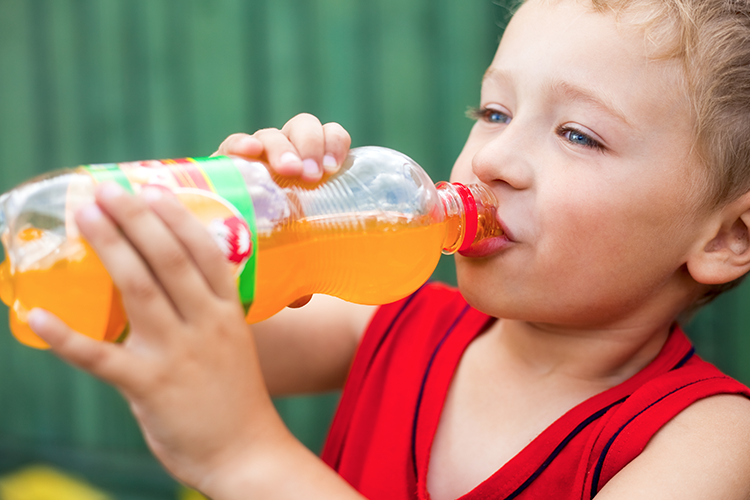Blog
Two-thirds of kids consume at least one soft drink a day
 In the U.S., it is recommended consumption of sugar-sweetened beverages should be limited to once a week.
In the U.S., it is recommended consumption of sugar-sweetened beverages should be limited to once a week.
An occasional fizzy drink at a birthday party is one thing. But according to data out of the U.S., two-thirds of kids in the U.S. are sipping a sugar-laden soda, energy, sports or another type of sweetened drink every day. Some as young as two.
Using data from the National Health and Nutrition Examination Survey (NHANES) undertaken in 2011-2012 and 2013-2014, the Centers for Disease Control and Protection (CDC) found 63% of children aged 2 to 19 consume one or more sugar-sweetened beverages daily. About 10% of youth consumed three or more sugary drinks a day.1
This data, unfortunately, did not account for fruit juices or flavoured milk. Imagine if it did?
And the older kids get, the more they seem to consume. In their teens, kids get nearly 10% of their daily energy intake from sugar-sweetened beverages, compared with 4% in pre-schoolers.
Why are we concerned?
Evidence is building thick and fast on the detrimental effects to health following too much sugary drink. It can impact learning and behaviour, as well as the health of teeth and the heart. And starting early can only lead to problems long-term.
“Consuming sugar-sweetened beverages is associated with weight gain, Type 2 diabetes, dental caries (cavities) and dyslipidemia (high cholesterol) in children, all of which have serious negative downstream health consequences,” says lead study author Asher Rosinger.
Limiting intake to 6 teaspoons a day
We ought to be aiming to limit intake of ALL added sugars to 6 teaspoons (about 25 grams) per day.2-3 Keep in mind one 375ml can of Coke contains 40 grams of sugar – that is 9.5 teaspoons!
Overconsumption of the sweet stuff is reflected in Australia.
61% of youth aged between 14 and 18 years consumed a sugar-sweetened beverage the day prior to an interview for the 2011-2012 Australian Health Survey. And on average, overall added sugar intake of kids between 2 and 16 years is reported to be 58.9 grams, or 14 teaspoons, a day.4–5
Stats like these highlight why it important we’ve careful consideration of what kids have access to at school as well as in the home. Examples like Yendarra School in South Auckland have proven great benefits to student learning, behaviour and health from introducing a water-only policy.
An occasional treat is fine, but sugary drinks should not be an everyday thing – for grown-ups as well as kids. So, help your and your kid’s health, swap out sweet stuff, and keep the liquid sugary drinks to a minimum.
By Angela Johnson (BHSc Nut. Med.)
References:
- CDC 2017, Sugar-sweetened Beverage Consumption Among U.S. Youth, 2011–2014, viewed 6 February 2017, <https://www.cdc.gov/nchs/products/databriefs/db271.htm
- World Health Organisation 2015, WHO calls on countries to reduce sugars intake among adults and children, viewed 26 July 2016, <http://www.who.int/mediacentre/news/releases/2015/sugar-guideline/en/>
- Vos, MB, Kaar, JL, Welsh, JA, Van Horn, L V, Feig, DI, Anderson, CAM, Patel, MJ, Cruz Munos, J, Krebs, NF, Xanthakos, SA & Johnson, RK 2016, ‘Added Sugars and Cardiovascular Disease Risk in Children’, Circulation, [Epub ahead of print]
- Louie, JC Moshtaghian, H Rangan, AM Flood, VM & Gill, TP 2015, ‘Intake and sources of added sugars among Australian children and adolescents’, European Journal of Nutrition, vol. 55, no. 8, pp. 2347-2355
- ABS 2015, Consumption Of Sweetened Beverages, Australian Bureau Of Statistics, viewed February 2017, <http://www.abs.gov.au/ausstats/abs@.nsf/Lookup/4364.0.55.007main+features7102011-12>











